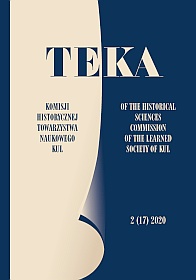„Czarodziej klawiatury” w świecie dyplomacji. Rola Ignacego Jana Paderewskiego w walce o polskie granice (1919-1920)
“Keyboard wizard” in the world of diplomacy. The role of Ignace Jan Paderewski in the fight for polish borders (1919-1920)
Author(s): Anna KrochmalSubject(s): History, Recent History (1900 till today), Pre-WW I & WW I (1900 -1919), Interwar Period (1920 - 1939)
Published by: Towarzystwo Naukowe Katolickiego Uniwersytetu Lubelskiego Jana Pawła II
Keywords: Ignace Jan Paderewski; Paris Peace Conference; Treaty of Versailles; Silesian Uprisings; Eastern Galicia; Cieszyn Silesia; Upper Silesia; Free City of Gdańsk
Summary/Abstract: Ignace Jan Paderewski (1860-1941) – a world-famous pianist, composer, politician, statesman and diplomat played a significant role in shaping the reborn Polish state and its borders. He undertook active political activity during the First World War. In the years 1915-1918, he acquired the President of the United States, Woodrow Wilson and his closest associates, as well as over 4 million American Polonia for the Polish cause. He gained real influence on the shaping of the territory and borders of the Polish state after taking office as the Prime Minister of the Polish Government and the Minister of Foreign Affairs. This took place on January 16, 1919. Paderewski led to the recognition of the reborn Polish state in the international arena by the United States (January 30, 1919), France (February 23), Great Britain (February 25), Italy (February 27), and then other countries. He represented Poland in Paris as a delegate to the peace conference. During the several months of deliberations he fought for the incorporation into the Polish state of Eastern Galicia, Cieszyn Silesia and Upper Silesia, as well as Gdańsk together with Pomerania. He was supported in these activities by well-known Polish scholars, both historians (Szymon Askenazy, Oskar Halecki, Władysław Konopczyński) and geographers (Eugeniusz Romer). Together with Roman Dmowski, he signed at Versailles on 28 June 1919 a peace treaty ending World War I. After resigning from the post of prime minister on December 9, 1919 and leaving the country, he was still interested in Polish affairs. He returned to political activity during the Bolshevik invasion of Poland. From July 1920 to May 1921, at the request of the Polish government and the head of state Józef Piłsudski, he was a Polish delegate to international conferences and a representative at the League of Nations.
Journal: Teka Komisji Historycznej Towarzystwa Naukowego KUL
- Issue Year: 17/2020
- Issue No: 1
- Page Range: 27-59
- Page Count: 33
- Language: Polish

